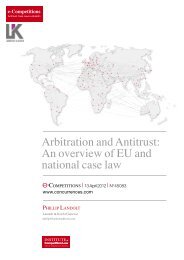Known
View Document - Landolt & Koch
View Document - Landolt & Koch
You also want an ePaper? Increase the reach of your titles
YUMPU automatically turns print PDFs into web optimized ePapers that Google loves.
BAHRAIN<br />
COMMENTARY<br />
STATUTORY ARBITRATION<br />
Is “statutory arbitration” international arbitration?<br />
It has been widely claimed that the statutory arbitration created by the<br />
legislative decree is “the world’s first statutory arbitration”. It may be more<br />
precise to say that it appears to be the world’s first “statutory arbitration”<br />
applying widely to “commercial” matters. Certainly there already exist a<br />
multitude of instances of “statutory arbitration”<br />
in specific legal relationships (eg, employment<br />
relationships and investor protection) and business<br />
sectors (eg, sports).<br />
The question arises whether statutory arbitration<br />
under the legislative decree is international arbitration<br />
at all, a question that is particularly pertinent given<br />
the formal change of its name to Judicial Dispute<br />
Resolution Proceedings. Whatever it is called,<br />
the process does present a number of important<br />
arbitration features – such as stringently limited<br />
challenges and a general exclusion of appeals on the<br />
merits. But it would appear that statutory arbitration<br />
is not international arbitration at all when it comes to<br />
the crucial area of enforcing arbitration awards under<br />
the New York Convention.<br />
If the New York Convention is interpreted as<br />
extending only to arbitration awards arising from<br />
arbitration agreements (as seems to be correct),<br />
Bahrain’s system of statutory arbitration obviously<br />
cannot engender a New York Convention award.<br />
Indeed, a number of the grounds for refusing recognition of an award under<br />
the New York Convention presuppose that the arbitration took place upon<br />
party agreement.<br />
On the other hand, each country that is signatory to the New York<br />
Convention is free to interpret the instrument as it sees fit within the limits<br />
of good faith.<br />
If a country refuses to enforce a Bahraini statutory arbitration award<br />
under the New York Convention, however, it is doubtful whether Bahrain<br />
could punish it by treating it as a non-contracting state, despite having<br />
entered the reciprocity reservation relating to application of the convention.<br />
The pros and cons<br />
While it remains to be seen how statutory arbitration will work in<br />
practice, certain of its essential features appear, on the face of it, to be most<br />
attractive to business. For example, the possibility of having international<br />
commercial judges, academics, or legal or other practitioners as part of the<br />
panel of adjudicators promises to import significant expertise, and would be<br />
particularly useful in cases where the substantive law is not Bahraini law, but<br />
some foreign law.<br />
The fact that the parties can agree on the language of the dispute is<br />
also an important pro-business feature. Such an advantage is rare in civil<br />
proceedings around the world, although it is not infrequent that parties are<br />
spared having to translate documents in English or another widely used<br />
language in the country.<br />
The limited grounds of challenge, and the exclusion of appeals on the<br />
merits, also make statutory arbitration decisions, at least on paper, a good<br />
deal more final than most first instance decisions in legal systems around<br />
the world. The requirement that challenges are decided by the Court of<br />
Cassation, Bahrain’s last-instance court, would indicate that such decisions<br />
are very final indeed.<br />
One might criticise as unduly conservative, however, the provision in<br />
the legislative decree stating that Bahraini law applies on the merits unless<br />
the parties agree otherwise. Still, since the BCDR-AAA’s jurisdiction is<br />
The immediate<br />
attractiveness of<br />
statutory arbitration<br />
will promote an<br />
accretion of<br />
commercial law<br />
decisions under<br />
Bahraini law<br />
limited to high-value disputes, one can expect the parties will have the<br />
foresight to stipulate any preference they have regarding the applicable law.<br />
Moreover, there may be a vital functional reason for the provision.<br />
If, as seems to be the case, the Bahraini legislator is seeking to harmonise<br />
commercial litigation and arbitration, upon the model of the latter, it is<br />
necessary to foster the development of Bahraini commercial law in a public<br />
forum before it starts being used in private and perhaps even confidential<br />
dispute settlement.<br />
An evolving concept?<br />
Nominally, statutory arbitration falls under the<br />
jurisdiction of the BCDR-AAA. But the reality<br />
is that it will be overseen by the ordinary judicial<br />
authorities in Bahrain, and it is not altogether clear<br />
from the legislative decree what role the BCDR-<br />
AAA will have beyond appointing the panel of<br />
arbitrators.<br />
Since, however, the system is being presented as<br />
arbitration – and especially if the BCDR-AAA has<br />
significant powers over the process – it may be that in<br />
time statutory arbitration will evolve to share features<br />
of classic arbitration under the legislative decree. Is<br />
this the Bahraini legislator’s far-sighted intention? The<br />
proposition is not impossible. Certainly the essential<br />
structure of the legislative decree would support<br />
this and, practically speaking, this evolution could<br />
be translated into binding law merely by amending<br />
the implementing regulation. The administrative<br />
fee structure – ad valorem up to 5 per cent of the<br />
amount in dispute – is distinctly reminiscent of<br />
arbitration and appears to portend such a development.<br />
In the meantime, the immediate attractiveness of statutory arbitration<br />
will promote an accretion of commercial law decisions under Bahraini law,<br />
since, as seen above, Bahraini law will apply in the absence of any party<br />
stipulation to the contrary.<br />
ARBITRATION BY AGREEMENT<br />
Advantages, and some questions<br />
Classic arbitration under the legislative decree and the BCDR-AAA<br />
Arbitration Rules is as modern as one might hope. Since the BCDR-<br />
AAA Arbitration Rules are a virtual carbon copy of the AAA International<br />
Arbitration Rules, they present the advantages of proven effectiveness and<br />
high predictability. Predictability in particular is assured since the AAA is<br />
advising the Bahrain Ministry of Justice, and the BCDR-AAA board of<br />
trustees and its secretariat include persons familiar with the workings of the<br />
AAA and its international arbitration rules.<br />
There is a question as to whether the material jurisdictional limitations<br />
applying to statutory arbitration apply to classic arbitration upon agreement<br />
of the parties under the legislative decree. Those limitations are enunciated<br />
in the chapter applying, exclusively it would appear, to statutory arbitration<br />
– confining it to commercial and international matters of a certain value.<br />
Certainly there are no such restrictions on arbitrations by agreement under<br />
the BCDR-AAA rules (an absence that is particularly conspicuous in light<br />
of the fact that the AAA International Arbitration Rules themselves limit<br />
their application to “international disputes”).<br />
The remarkably broad possibility of excluding all recourse against such<br />
awards before the Bahraini courts (discussed below) perhaps supports the<br />
idea that they should relate to a limited category of parties and subject<br />
matters. It would, however, appear the better view that the legislative decree<br />
and the BCDR-AAA rules should apply to all arbitrations by agreement,<br />
irrespective of the amount in dispute and of whether or not the dispute is<br />
commercial or international.<br />
Global Arbitration Review 27





